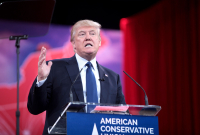Support strong Canadian climate journalism for 2025
WASHINGTON — Let the record show that this was the moment in the 2016 U.S. presidential election campaign that Donald Trump was effectively yanked off the funny pages.
A symbolic shift occurred Monday when his campaign proposed a ban on Muslims travelling to the United States — a restriction that would apparently even extend to Muslim-Americans returning home.
A partisan crowd delivered an ovation as the Republican poll-leader elaborated on the new policy, in a caustic speech where he railed at the media in the back of the room as, "Absolute scum."
"We have no choice," Trump said of his proposed Muslim travel ban.
As he took the stage, the Huffington Post announced its own policy change. Trump was no longer to be treated as a joke. The website had covered Trump in its entertainment section since the summer, a gesture of ridicule for a candidate it derided as a buffoonish interloper in the serious process of picking a president.
Now the primaries are less than two months away. Trump remains in first place in the Republican polls. And he's supplemented his promise to deport 11 million mostly Hispanic illegal migrants with a policy aimed at Muslims. It would be the United States' first culture-based entry ban in approximately seven decades, since the repeal of Asian-exclusion laws.
The comic relief is over, the site founder declared.
"(Trump's campaign has) morphed into something else: an ugly and dangerous force in American politics," Arianna Huffington wrote in a post.
"So we will no longer be covering his campaign in Entertainment. But that's not to say we'll be treating it as if it were a normal campaign... The 'can you believe he said that?' novelty has curdled and congealed into something repellent and threatening — laying bare a disturbing aspect of American politics.
"So if Trump's words and actions are racist, we'll call them racist. If they're sexist, we'll call them sexist. We won't shrink from the truth or be distracted by the showmanship."
The anti-Trump rhetoric hardened elsewhere.
He was condemned across the political spectrum with more severity than when he insulted Mexican migrants; made fun of Sen. John McCain's prisoner-of-war experience; and told what was widely perceived as a menstruation joke about a female TV personality.
People weren't comparing him to a clown anymore.
An official with Ohio Gov. John Kasich's campaign dropped the name of a former Ku Klux Klansman who entered politics: "A few years from now Trump will have the political appeal of David Duke," John Weaver tweeted. "It will exist, but only on the feverish dark edges of the swamp."
Equally unflattering comparisons came from Democrats running for president. Martin O'Malley tweeted: "(Trump) removes all doubt: he is running for President as a fascist demagogue." Sen. Bernie Sanders liked him to "demagogues throughout our history."
He was denounced by senior Republican party figures. Trump was reportedly disinvited from a party fundraising event. Top party officials in key primary states, New Hampshire and South Carolina, were scathing.
Former vice-president Dick Cheney told a radio interviewer: "(This) goes against everything we stand for and believe in. Religious freedom's been a very important part of our history, and where we came from."
The mayor of St. Louis, Francis Slay, tweeted: "We can no longer pretend Trump is an amusing sideshow. His statements affect our Muslim neighbors' lives and safety."
Like an inflatable punching bag, though, Trump has repeatedly bounced back from controversy and defied the disdain of opinion elites. The point was underscored Monday when one of his past critics predicted this, too, would work for him.
Some pundits examined polling data on attitudes toward Muslims and suggested this would improve his standing with Republican primary voters. Among those offering that view was Erick Erickson, a prominent conservative commentator who'd tangled with Trump in the past.
"Set aside the merits of what amounts to at least, in part, an unconstitutional position," Erickson wrote Monday. "This is actually brilliant politics for the here and now."
Alexander Panetta, The Canadian Press



Comments